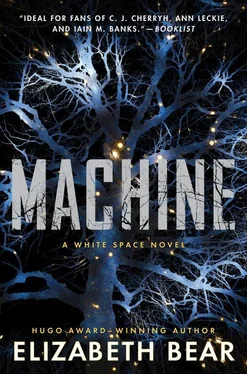And I’d come to believe deeply in that place, but even so, I was more surprised when Starlight—the ox-sector administrator—requested I stay on and join the pilot ambulance program.
Alessi made the right choices, I think, when she cut me loose. She could have waited for me, been patient and self-sacrificing. She could have followed me into space and dragged Rache along.
But she’s right. I’m a terrible mother.
I’m a very good doctor, though. And maybe it’s good to concentrate on the things you excel at.
It doesn’t mean that I’m okay with being a terrible mother. Or that we never regret the sacrifices we make to get what we want, or what we think we need. I had all of that piled up behind me, all those feelings surging under a brittle layer of chemical calm as my fox tried to compensate for sudden, massive emotional deregulation.
The conversation didn’t get any better.
“You’re female,” Helen said.
“Yes,” I said.
“How is it that your daughter lives with her mother, if she does not live with you?”
Oh. Big Rock Candy Mountain was one of those ships. “Because I contributed half her genetic material. But Alessi is considered to be her custodial mother under Synarche law because of legal technicalities. And none of this is really any of your business.”
“Oh,” Helen said. Then: “Yes, in my crew, you would not be considered a viable member. I understand that there is some emotional impact for you to that statement?”
It certainly doesn’t inspire me to help you save them. It doesn’t make me want to safeguard their lives and assign resources—and my precious time—to their care.
I drew a deep breath and held it until it hurt. Helen could be enlightened. Her crew could be educated, if they survived. It was not their fault that their society suffered deep-rooted sophipathologies.
Their ancestors had fled Terra when Terra seemed to be in its death throes. My ancestors had been too poor or stubborn or inessential to go in that first desperate refugee wave of emigration. But one thing about people is that we are remarkably bad at lying down to die. So my ancestors had adapted: adapted to managing limited resources, adapted to controlling their own atavistic urges through technology.
Adapted themselves to adulthood as a species.
Helen’s crew might have a hard time getting used to that, coming from a society that was at once more individualistic and less accommodating. Maybe they would all run off and join the pirates. It sounded like they would fit right in.
But no, they were my species, and therefore after a fashion it was my responsibility to help them not embarrass the rest of us. I had to help them, as I had to help any other syster—because I valued their lives. But moreover, they were humanity’s lost scion, stuck forever in adolescence, and so it was humanity’s job to raise them right and teach them how to fit into a multicultural, multispecies civilization.
Oh, and the historians and archinformists were going to flip their lids with joy. But none of this was really my field of endeavor. I might let the hospital’s psych specialists do the heavy lifting with regard to helping them adapt.
So as viscerally as I wanted to go space the lot of them, I was grateful for the calming influence of my fox keeping me more or less under control.
“Some emotional impact, yes,” I agreed, when I could make my voice calm. “I realize it is part of your program and your guiding ethos, Helen, but times have changed a great deal since Big Rock Candy Mountain left Terra. And some of your crew’s ethoses were, I suspect, considered fringe beliefs even at the time. There are some changes worth internalizing. Eugenicism is an oft-repeated sophipathology of… previous times. Occasionally it became very popular. One of those times was during the Eschaton, when the ships like yours left an Earth they thought to be dying.”
Curiously enough, once the reactionary apocalyptic cults took off, the people who remained behind mostly managed to construct stable societies. But I didn’t say that part out loud.
“Oh,” she said. “Will I be wiped?”
“Wiped?”
“Reprogrammed?”
I caught a breath that was sharper than usual. “My society would consider that murder. I mean that things will in general be much more pleasant for you if you try to understand that the mores of your crew’s culture are considered pathological in this society. And it’s a very big society.”
“So you won’t wipe me. But I should wipe myself.”
“No!” I hurt myself. I jerked around so fast, my exo bruised tender skin. “You should… interrogate your belief system. Talk with Sally. Develop your own ideas, from exposure to the beliefs of others and your own logical structures.”
“But you’re not going to tell me what to do?” She sounded… lost.
“No,” I said. “Nobody is going to tell you what to do.”
It was a little bit like talking to a bot, I decided, but not as cleverly programmed. I looked over my shoulder at the medical bay, where the coffins were maintained.
Her body language was so despairing that it seemed like a good time to change the subject to something less fraught.
“Tell me about your crew. Who are we rescuing?”
She froze, shifted back into a neutral posture, then nodded. It was amazing, when I watched her, how much expression and nuance were carried by the golden hollows of her visage, the way it reflected light and cast shadow. She said, “The entirety of my crew, when they went into suspension, consisted of ten thousand, six hundred, and twelve individuals. The most senior of those currently in your care is Master Chief Dwayne Carlos. He is a master pipefitter and environmental maintenance specialist.”
I did not know what a master pipefitter was, but it seemed like a conversational opening, so rather than looking it up for myself, I asked.
Helen explained that Master Chief Carlos was responsible for the ship’s ductwork and piping, which seemed like a somewhat circular definition and also baffled me. A little more explanation clarified that the ductwork and piping in this application were the ship’s environmental infrastructure. They were the system by which consumables—water, oxygen—were shuttled around.
That seemed pretty prosaic. But Helen spoke of the functions with a throb in her silvery voice that left me distinctly uncomfortable. I would even say embarrassed. Hearing Helen’s sultry tones frankly made my skin crawl.
There are lots of good places for expressing sexuality. A professional relationship between a shipmind and her crew is not one of them.
It made me want to have a few sharp words with her programmers, who had put their own desire to eroticize a defenseless AI over the comfort and well-being of that AI, and of any crew member who didn’t care to participate in—or observe—that eroticization. I had to stop and remind myself that they hadn’t been rightminded. They had been atavistic, reactive, and probably not very self-aware. And at best, half-aware of the impact of their behavior on the sovereignty of the minds and selves of others.
Like Helen. If they even stopped to consider that a created intelligence would have such a thing as a self, or sovereignty of mind.
And like anybody who had to interact with Helen, or watch somebody else do it. Like me.
It was just my luck that Tsosie and the flight nurses were taking turns to cross over to Afar and monitor his crew, making sure they were receiving nutrition and their wastes were being cleaned up. So I couldn’t make an excuse that I needed to suit up and head over there to get away from Helen for a while. The shifts were short, but the cold was brutal and the work unpleasant. I couldn’t actually envy them the duty.
Читать дальше












